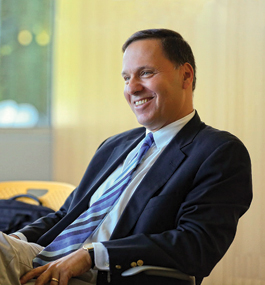From the President
Discussing Brandeis’ Jewish Identity

Mike Lovett
President Ronald D. Liebowitz
I have embarked on a series of conversations about Brandeis’ Jewish identity with various groups across the university. My goal in having these discussions is to lead our community toward a better understanding of our history and to reaffirm the principles underlying our trailblazing founding: a commitment to academic rigor; the welcoming of all academically qualified students regardless of background, religion, or beliefs; and the honoring of our commitments to the American Jewish community, which established the university in 1948.
From the start, Brandeis was animated by a set of values rooted in Jewish history and experience, including a reverence for learning, critical thinking that requires reflection and expects self-criticism, and a commitment to repairing the world through one’s talents and actions. Over the past seven decades, these values have become universal across most of higher education. It is now Brandeis’ challenge to once again set the example for higher education in how to be an open and inclusive institution of excellence for higher learning.
Like many universities, nonprofits, and corporations, Brandeis is committed to achieving greater institutional diversity, equity, and inclusion (DEI). This typically includes addressing and countering the many forms of hate and injustice still perpetrated in our society against African Americans, Latinx people, Asians and Asian Americans, Native Americans, the LGBTQ+ community, and people with disabilities.
To succeed now and into the future, Brandeis must be clear in its messaging about where Jews fit into this work. There are many examples of how efforts to advance inclusion elsewhere have excluded Jews and, worse, have assigned to them identities based on stereotypes rooted in demeaning antisemitic tropes that originated millennia ago.
Ironically, in those cases where DEI programs at universities exclude Jews, there is an undermining of attributes they seek to advance: diversity and inclusion across a university’s entire community and a celebration of diversity within the community’s groups.
Jews are hardly a monolithic group, despite how they are viewed on many university campuses. There is remarkable diversity within the Jewish world, beginning with the secular-religious continuum; the multiple visions of Zionism, each with distinct historical and philosophical legacies; and the extraordinary cultural diversity among the Ashkenazi (Jews predominantly from Eastern Europe), Sephardi (Jews who were banished from Spain in the 15th century), Mizrahi (Jews from North Africa, the Levant, Iran, and Yemen — most expelled after 1948), and other Jews of color (mostly from Ethiopia). In addition, there is the cohort of “Jews by choice” — individuals who have converted to Judaism — who represent a distinct and growing voice among the Jewish people.
To recognize Jews more deliberately in DEI work would also help counter the increasing prevalence of antisemitism on many university campuses. The increase in the number of antisemitic acts in general, and on campuses in particular, was affirmed in the recent Pew Research Center study “Jewish Americans in 2020.” Though some will claim that antisemitism is not as evident or problematic on the Brandeis campus as it is elsewhere and therefore should take a back seat to fighting other forms of hate, we must remind ourselves that we are educating our students for a lifetime, not solely for their four-year experience in Waltham. They need to be prepared for life beyond Brandeis, when they are likely to encounter nuanced and sometimes not-so-nuanced forms of Jew-hate.
Including Brandeis’ history and the university’s relationship to the American Jewish community in our new students’ orientation and in our faculty and staff onboarding process would help explain aspects of the university that often confuse newcomers and work against our goals of inclusivity. Not being aware of this history has left many on campus feeling disconnected and unable to tap into all that a Brandeis education offers. Jews themselves would benefit from understanding the institution’s history and being part of a broadened approach to DEI. The dominant “Ashkenormative” understanding of the meaning of “Jewish” continues to evolve — becoming more inclusive in the United States and Israel, and right here at Brandeis in our Near Eastern and Judaic studies curriculum — yet many American Jews remain unaware of this change.
These conversations about Brandeis’ relationship to its Jewish founding pose critical questions about the university’s identity with which we must grapple as a community. I invite you to share your reactions and ideas with me. As we look ahead to the university’s future, I will continue to rely on alumni and friends like you to wrestle with difficult and complex issues.
Best regards,
Ronald D. Liebowitz
rdlreply@brandeis.edu
